The Young Living Difference
What Sets Young Living Apart?
What makes Young Living different from all the other oils
you find in the big box stores, health food stores, and etc?

Our Seed to Seal Guarantee is what sets Young Living apart from all the other oil companies! An unmatched guarantee! From the selection and planting of the seed, to the growing on our own and our partner farms, to the distillation process and packaging, there are never any chemicals added to our oils. By having our own farms and distillers, we can guarantee this. We've also been around for 30 years and have the expertise to know exactly when each type of plant needs to be harvested to get the highest number of constituents (or components) from each oil. This is only learned through years of experience and testing with the oils. No other company has this background.
you find in the big box stores, health food stores, and etc?

Our Seed to Seal Guarantee is what sets Young Living apart from all the other oil companies! An unmatched guarantee! From the selection and planting of the seed, to the growing on our own and our partner farms, to the distillation process and packaging, there are never any chemicals added to our oils. By having our own farms and distillers, we can guarantee this. We've also been around for 30 years and have the expertise to know exactly when each type of plant needs to be harvested to get the highest number of constituents (or components) from each oil. This is only learned through years of experience and testing with the oils. No other company has this background.

When you are looking for oils to purchase - ask them where their farms are! The other companies have to purchase
their raw material from somewhere and have to send out for distillation to someplace--so there is absolutely no
guarantee of what you are getting! Even though they're telling you it's 100% pure, certified, therapeutic grade oil! (Our federal labeling laws allow them to "say" it's 100% natural, therapeutic, certified oil-if only a small percentage of it is-the rest of the oil can be synthetic)
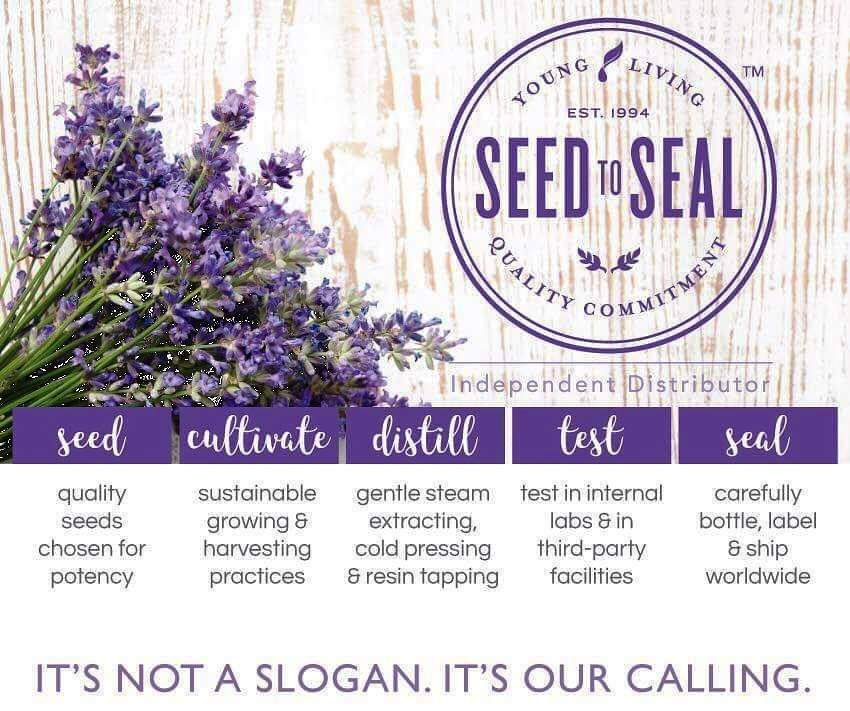
Young Living Oils are 100% Pure Oils--guaranteed through our Seed to Seal Process. We also have our Vitality line which is GRAS (Generally Recognized As Safe) and may be taken internally. These oils will have a white label on them and are dietary/internal oils for consumption. The "white labeled Vitality" oils are no different, however, than the same oil in a colored label. The FDA has required labeling a dietary and a cosmetic oil (topical or diffused) oil differently--so you can tell them apart!
their raw material from somewhere and have to send out for distillation to someplace--so there is absolutely no
guarantee of what you are getting! Even though they're telling you it's 100% pure, certified, therapeutic grade oil! (Our federal labeling laws allow them to "say" it's 100% natural, therapeutic, certified oil-if only a small percentage of it is-the rest of the oil can be synthetic)

Young Living Oils are 100% Pure Oils--guaranteed through our Seed to Seal Process. We also have our Vitality line which is GRAS (Generally Recognized As Safe) and may be taken internally. These oils will have a white label on them and are dietary/internal oils for consumption. The "white labeled Vitality" oils are no different, however, than the same oil in a colored label. The FDA has required labeling a dietary and a cosmetic oil (topical or diffused) oil differently--so you can tell them apart!
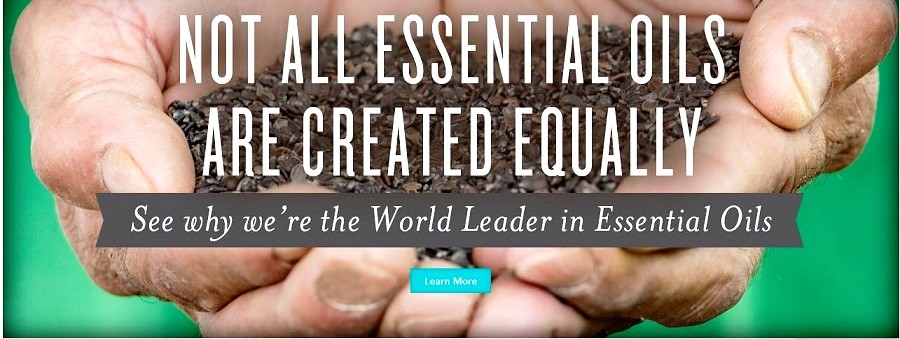
There is a big difference in what you buy in the store. Many of those bottles say "not for internal use".
Why would you want to use an oil topically or aromatically if it's not safe to ingest?
Anything that goes "ON" your skin-also goes "INTO" your body
Question--if an oil is pure and taken directly from a plant that you can eat, why would the oil not be safe to eat?
If it's pure, it would be fine; if it's full of chemicals, it's not.
Question--if an oil is pure and taken directly from a plant that you can eat, why would the oil not be safe to eat?
If it's pure, it would be fine; if it's full of chemicals, it's not.
Our bottles also do not have expiration dates on them. Oils do not expire, but the chemicals in your home do.
Check your aspirin bottles, etc. There are expiration dates on these.
Check your aspirin bottles, etc. There are expiration dates on these.
This IS the Young Living Difference!
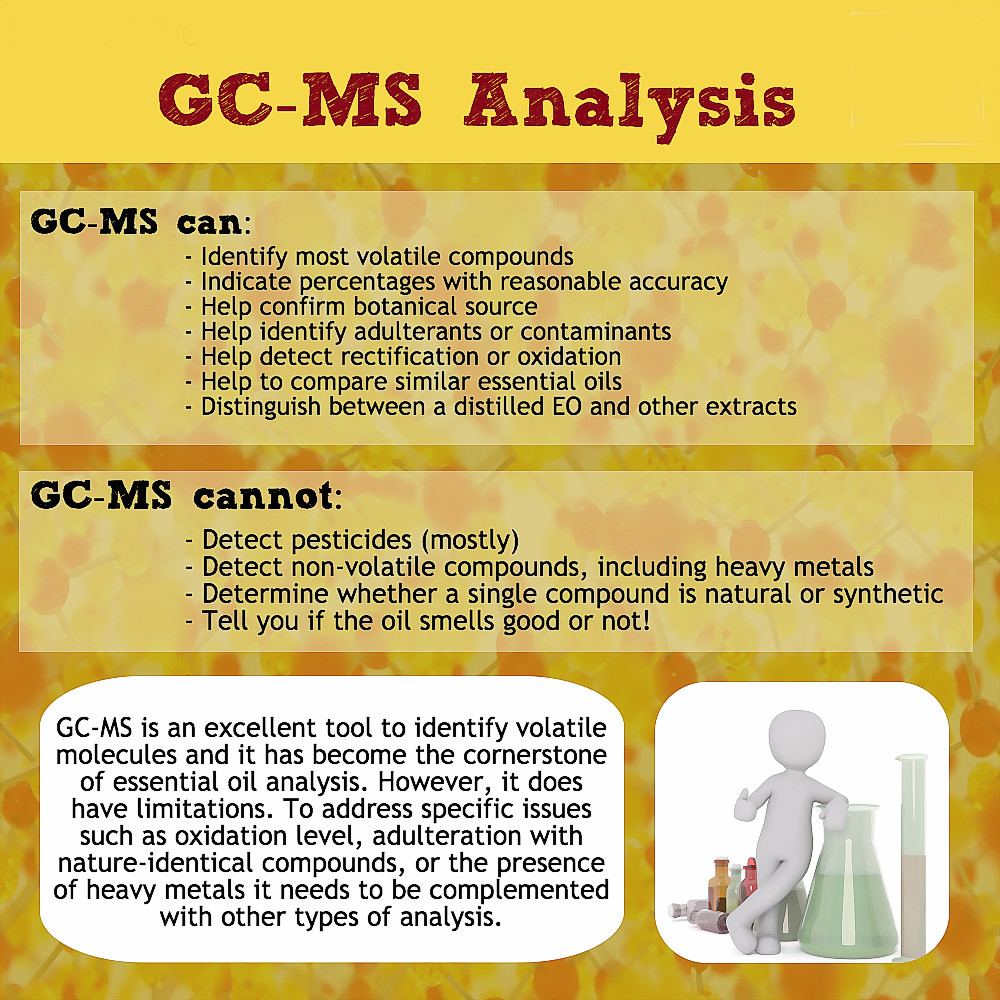
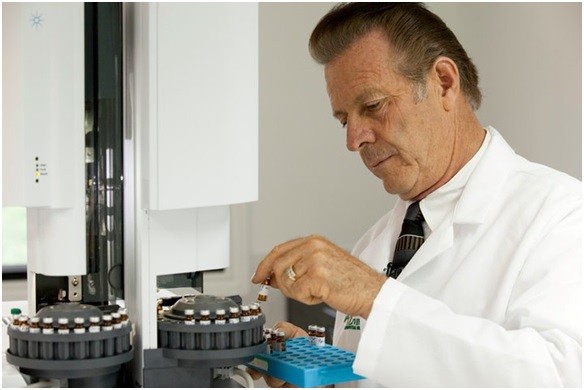
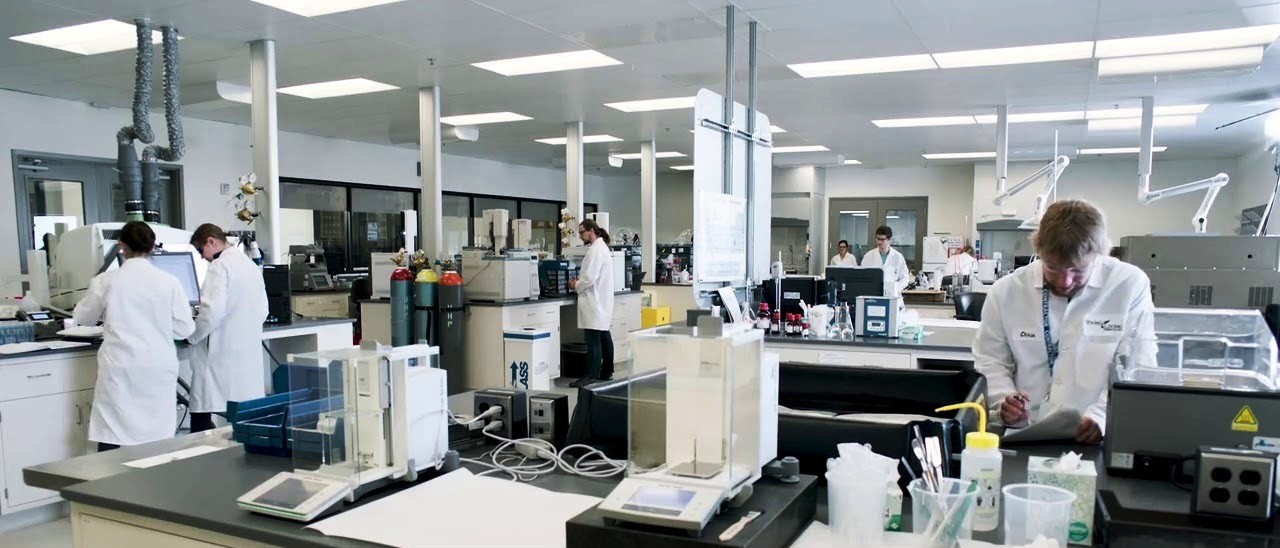

What's in the testing??
Are the GC-MS tests the final answer? Anyone who is beginning to dive deep into essential oils will sooner or later come across the term GC-MS. The first thing that someone will find confusing is the fact that these terms are often spoken about as if they are the same thing. GC stands for gas chromatography, while MS refers to mass spectrometry. While typically spoken about synonymously, they are actually two completely separate pieces of equipment.
On a basic level, these machines are simply used to determine the quality of an essential oil. Each of these is used in conjunction to draw conclusions regarding the quality of essential oils differently. Although these are the most common tools used for this purpose there are others that can also determine factors about quality with their results.
Because Young Living has an unwavering commitment of producing genuine, AUTHENTIC therapeutic-grade essential oils, we conduct several ROUTINE quality tests on EACH and EVERY batch of essential oil. In fact, Young Living runs between 15-20 tests on EVERY BATCH OF OIL, most of which are repeated 3 times after distillation, and then again, another 3 times AFTER bottling; far more than any other company. Yes, I said 3 times TWICE! That means Young Living conducts between 90 to 120 tests on EVERY batch of essential oil. – NO OTHER ESSENTIAL OIL COMPANY in the world goes to the same great lengths (and expense) to ensure the quality of their oils.
Young Living has bought and compiled an essential oil retention index and mass spectral reference library that currently contains over 400,000 components. Young Living has more than 1.3 million oil molecule references in their library. It’s the only library of it’s kind in the world. Using this research reference library, Young Living conducts the tests on every batch of essential oil! It’s part of our whole SEED-to-SEAL process which is your assurance that we have the highest quality, pure, genuine, AUTHENTIC therapeutic-grade essential oils in the world.
Adulteration of essentials oils will become more and more common as the supply of top-quality essential oils dwindles and demand continues to increase. Adulteration may occur by diluting the essential oil with fatty lipid oils. This is a common practice by some essential oil companies to increase supply and reduce cost. These adulterated essential oils will jeopardize the integrity of aromatherapy and essential oil use. Adulteration has become such a major concern that each essential oil Young Living offers is tested in the manner above by Young Living’s trained research and quality control scientists. Batches that do not meet established standards are rejected and returned. This process ensures that you are getting the world’s best and purest essential oils available.
Young Living has bought and compiled an essential oil retention index and mass spectral reference library that currently contains over 400,000 components. Young Living has more than 1.3 million oil molecule references in their library. It’s the only library of it’s kind in the world. Using this research reference library, Young Living conducts the tests on every batch of essential oil! It’s part of our whole SEED-to-SEAL process which is your assurance that we have the highest quality, pure, genuine, AUTHENTIC therapeutic-grade essential oils in the world.
Adulteration of essentials oils will become more and more common as the supply of top-quality essential oils dwindles and demand continues to increase. Adulteration may occur by diluting the essential oil with fatty lipid oils. This is a common practice by some essential oil companies to increase supply and reduce cost. These adulterated essential oils will jeopardize the integrity of aromatherapy and essential oil use. Adulteration has become such a major concern that each essential oil Young Living offers is tested in the manner above by Young Living’s trained research and quality control scientists. Batches that do not meet established standards are rejected and returned. This process ensures that you are getting the world’s best and purest essential oils available.
Yes, We Have An Oil For That
Breathe deeply...
Our pure essential oils and essential oil blends take you on a sensory journey
that can instantly create a calming or balancing atmosphere.
From the sweet aroma of Lavender to the stimulating fragrance of Eucalyptus, our therapeutic-grade
essential oils ignite your senses. Extensive testing and a commitment to sustainability means each bottle contains quality essential oils with remarkable properties that can’t be found elsewhere. Whether it’s a single, potent oil that elevates your spirit; a blended formula that promotes mental clarity; or Vitality™ essential oils you rely on to support your healthy habits, you can find your companion in whole-life wellness.
Young Living currently has over 270 single oils and blends just for you.
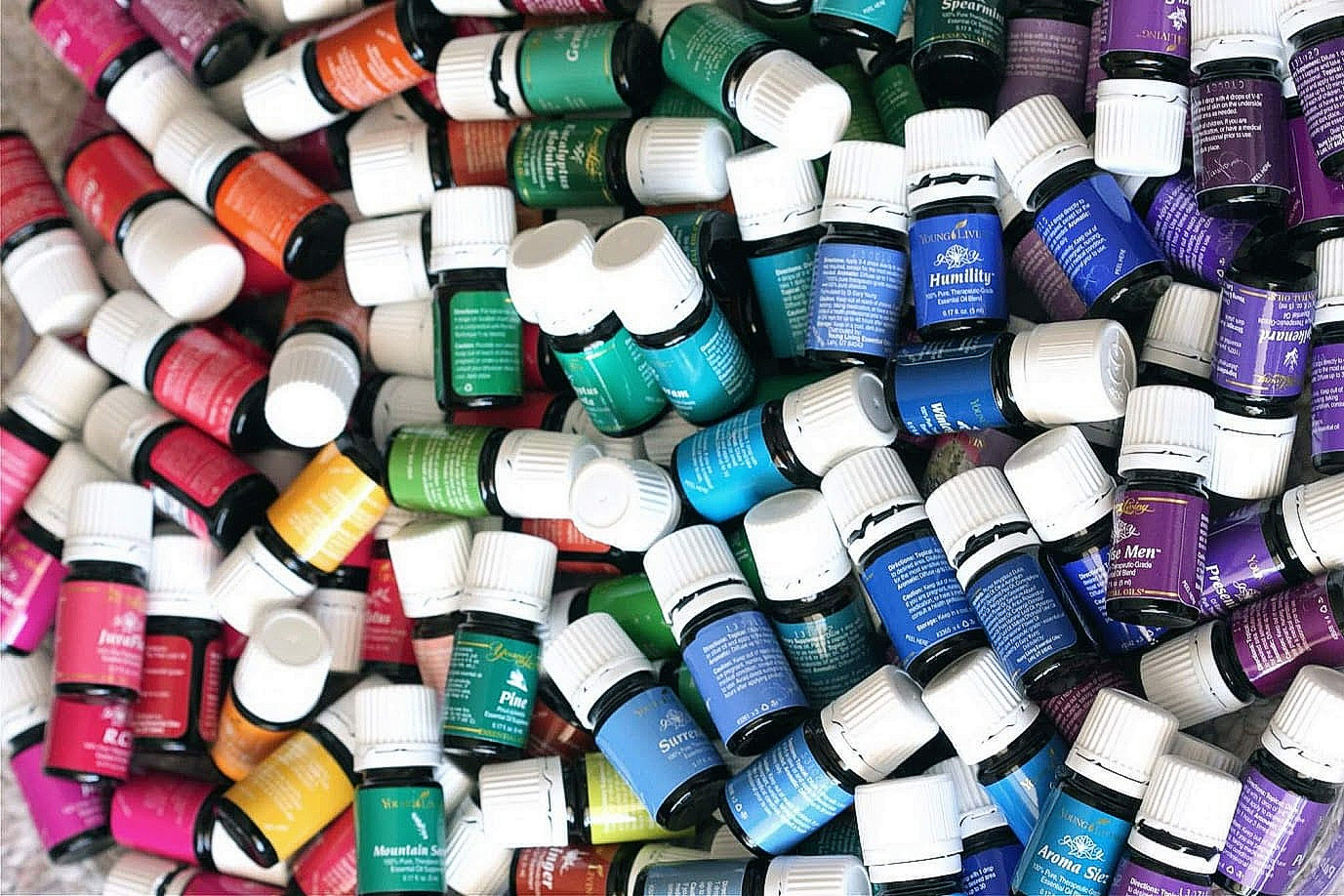
And oils are only the beginning with Young Living. We have over 600 products all designed
without harsh chemicals and many infused with these precious and delicate oils to help you live the
healthiest lifestyle you can. See more of what we have to offer.
essential oils ignite your senses. Extensive testing and a commitment to sustainability means each bottle contains quality essential oils with remarkable properties that can’t be found elsewhere. Whether it’s a single, potent oil that elevates your spirit; a blended formula that promotes mental clarity; or Vitality™ essential oils you rely on to support your healthy habits, you can find your companion in whole-life wellness.
Young Living currently has over 270 single oils and blends just for you.

And oils are only the beginning with Young Living. We have over 600 products all designed
without harsh chemicals and many infused with these precious and delicate oils to help you live the
healthiest lifestyle you can. See more of what we have to offer.

